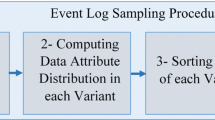Abstract
A variety of predictive process monitoring techniques based on machine learning (ML) have been proposed to improve the performance of operational processes. Existing techniques suggest different ML algorithms for training predictive models and are often optimized based on a small set of event logs. Consequently, practitioners face the challenge of finding an appropriate ML algorithm for a given event log. To overcome this challenge, this paper proposes Predictive Recommining, a framework for suggesting an ML algorithm and a sequence encoding technique for creating process predictions based on a new event log’s characteristics (e.g., loops, number of traces, number of joins/splits). We show that our instantiated framework can create correct recommendations for the next activity prediction task.
Access this chapter
Tax calculation will be finalised at checkout
Purchases are for personal use only
Similar content being viewed by others
Notes
- 1.
In our case, we use a support vector classifier (SVC).
- 2.
For this task, any explainable ML approach can be used.
- 3.
- 4.
We set the size of the windows to 3 as recommended by [12].
- 5.
For detailed information about the hyper-parameter range, visit https://gitlab.uni-koblenz.de/process-science/research/predictive-recommining/recomminer.
- 6.
For better readability, we only included in the plot the first 40 event logs. The plot that includes all 60 event logs can be found in the online repository.
References
Augusto, A., Mendling, J., Vidgof, M., Wurm, B.: The connection between process complexity of event sequences and models discovered by process mining. Inf. Sci. 598, 196–215 (2022)
Bergstra, J., Bardenet, R., Bengio, Y., Kégl, B.: Algorithms for hyper-parameter optimization. In: Advances in Neural Information Processing Systems, vol. 24 (2011)
vanden Broucke, S.K., Delvaux, C., Freitas, J., Rogova, T., Vanthienen, J., Baesens, B.: Uncovering the relationship between event log characteristics and process discovery techniques. In: Business Process Management Workshops, pp. 41–53 (2013)
Brunk, J., Stottmeister, J., Weinzierl, S., Matzner, M., Becker, J.: Exploring the effect of context information on deep learning business process predictions. J. Decis. Syst. 29(sup1), 328–343 (2020)
Burattin, A.: PLG2: multiperspective process randomization with online and offline simulations. In: CEUR Workshop Proceedings (2016)
Di Francescomarino, C., Ghidini, C., Maggi, F.M., Milani, F.: Predictive process monitoring methods: which one suits me best? In: International Conference on Business Process Management, pp. 462–479 (2018)
Drodt, C., Weinzierl, S., Matzner, M., Delfmann, P.: The recomminder: a decision support tool for predictive business process monitoring. In: Proceedings of the Best Dissertation Award, Doctoral Consortium, and Demonstration & Resources Track at BPM 2021 co-located with 19th International Conference on Business Process Management (BPM 2021). CEUR Workshop Proceedings, vol. 2973, pp. 131–135 (2021)
Evermann, J., Rehse, J.R., Fettke, P.: Predicting process behaviour using deep learning. Decis. Support Syst. 100, 129–140 (2017)
Heinrich, K., Zschech, P., Janiesch, C., Bonin, M.: Process data properties matter: introducing gated convolutional neural networks (GCNN) and key-value-predict attention networks (KVP) for next event prediction with deep learning. Decis. Support Syst. 143, 113494 (2021)
Leontjeva, A., Conforti, R., Di Francescomarino, C., Dumas, M., Maggi, F.M.: Complex symbolic sequence encodings for predictive monitoring of business processes, pp. 297–313 (2015)
Márquez-Chamorro, A.E., Resinas, M., Ruiz-Cortés, A., Toro, M.: Run-time prediction of business process indicators using evolutionary decision rules. Expert Syst. Appl. 87, 1–14 (2017)
Marquez-Chamorro, A.E., Resinas, M., Ruiz-Cortes, A.: Predictive monitoring of business processes: a survey. IEEE Trans. Serv. Comput. 11(6), 962–977 (2018)
Senderovich, A., Di Francescomarino, C., Ghidini, C., Jorbina, K., Maggi, F.M.: Intra and inter-case features in predictive process monitoring: a tale of two dimensions. In: International Conference on Business Process Management, pp. 306–323 (2017)
Tama, B.A., Comuzzi, M.: An empirical comparison of classification techniques for next event prediction using business process event logs. Expert Syst. Appl. 129, 233–245 (2019)
Teinemaa, I., Dumas, M., Leontjeva, A., Maggi, F.M.: Temporal stability in predictive process monitoring. Data Min. Knowl. Discovery 32(5), 1306–1338 (2018)
Weinzierl, S., et al.: An empirical comparison of deep-neural-network architectures for next activity prediction using context-enriched process event logs. arXiv (2020)
Acknowledgments
Funded by the Deutsche Forschungsgemeinschaft (DFG, German Research Foundation) - Research Grant No. 432399058 and No. 445156547
Author information
Authors and Affiliations
Corresponding author
Editor information
Editors and Affiliations
Rights and permissions
Copyright information
© 2023 The Author(s), under exclusive license to Springer Nature Switzerland AG
About this paper
Cite this paper
Drodt, C., Weinzierl, S., Matzner, M., Delfmann, P. (2023). Predictive Recommining: Learning Relations Between Event Log Characteristics and Machine Learning Approaches for Supporting Predictive Process Monitoring. In: Cabanillas, C., Pérez, F. (eds) Intelligent Information Systems. CAiSE 2023. Lecture Notes in Business Information Processing, vol 477. Springer, Cham. https://doi.org/10.1007/978-3-031-34674-3_9
Download citation
DOI: https://doi.org/10.1007/978-3-031-34674-3_9
Published:
Publisher Name: Springer, Cham
Print ISBN: 978-3-031-34673-6
Online ISBN: 978-3-031-34674-3
eBook Packages: Computer ScienceComputer Science (R0)




